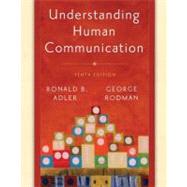
Note: Supplemental materials are not guaranteed with Rental or Used book purchases.
Purchase Benefits
What is included with this book?
| Each Chapter ends with a Summary, Key Terms, Activities, and For Further Exploration | |
| Elements of Communication | |
| Human Communication: What and Why | |
| Communication Defined | |
| Communication Is a Process | |
| Communication Is Symbolic | |
| Types of Communication | |
| Intrapersonal Communication | |
| Dyadic/Interpersonal Communication | |
| Small Group Communication | |
| Public Communication | |
| Mass Communication | |
| Functions of Communication | |
| Physical Needs | |
| Identity Needs | |
| Social Needs | |
| Practical Needs | |
| Modeling Communication | |
| A Linear Model | |
| A Transactional Model | |
| Communication Competence: What Makes an Effective Communicator? | |
| Communication Competence Defined | |
| Characteristics of Competent Communicators | |
| Intercultural Communication Competence | |
| Competence in Mediated Communication | |
| Clarifying Misconceptions About Communication | |
| Communication Does Not Always Require Complete Understanding | |
| Communication Isn't Always a Good Thing | |
| No Single Person or Event Causes Another's Reaction | |
| Communication Will Not Solve All Problems | |
| Meanings Rest in People, Not Words | |
| Communication Is Not Simple | |
| More Communication Is Not Always Better | |
| The Self, Perception, and Communication | |
| Communication and the Self | |
| Self-Concept Defined | |
| Communication and the Development of the Self | |
| Culture and the Self-Concept | |
| The Self-Concept and Communication with Others | |
| The Self-Fulfilling Prophecy | |
| Perceiving Others | |
| Steps in the Perception Process | |
| Narratives and Perception | |
| Common Perceptual Tendencies | |
| Perception and Culture | |
| Empathy and Perception | |
| Communication and Identity Management | |
| Public and Private Selves | |
| Characteristics of Identity Management | |
| Why Manage Impressions? | |
| How Do We Manage Impressions? | |
| Impression Management and Honesty | |
| Language | |
| The Nature of Language | |
| Language Is Symbolic | |
| Meanings Are in People, Not Words | |
| Language Is Rule-Governed | |
| The Power of Language | |
| Language Shapes Attitudes | |
| Language Reflects Attitudes | |
| Troublesome Language | |
| The Language of Misunderstandings | |
| Disruptive Language | |
| Evasive Language | |
| Gender and Language | |
| Content | |
| Reasons for Communicating | |
| Conversational Style | |
| Nongender Variables | |
| Culture and Language | |
| Verbal Communication Styles | |
| Language and Worldview | |
| Listening | |
| Misconceptions About Listening | |
| Listening and Hearing are Not the Same Thing | |
| Listening Is Not a Natural Process | |
| Mindful Listening Requires Effort | |
| All Listeners Do Not Receive the Same Message | |
| Overcoming Challenges to Effective Listening | |
| Faulty Listening Behaviors | |
| Reasons for Poor Listening | |
| Personal Listening Styles | |
| Content-Oriented | |
| People-Oriented | |
| Action-Oriented | |
| Time-Oriented | |
| Informational Listening | |
| Don't Argue or Judge Prematurely | |
| Separate the Message from the Speaker | |
| Be Opportunistic | |
| Look for Key Ideas | |
| Ask Questions | |
| Paraphrase | |
| Take Notes | |
| Critical Listening | |
| Listen for Information Before Evaluating | |
| Evaluate the Speaker's Credibility | |
| Examine the Speaker | |
| Table of Contents provided by Publisher. All Rights Reserved. |
The New copy of this book will include any supplemental materials advertised. Please check the title of the book to determine if it should include any access cards, study guides, lab manuals, CDs, etc.
The Used, Rental and eBook copies of this book are not guaranteed to include any supplemental materials. Typically, only the book itself is included. This is true even if the title states it includes any access cards, study guides, lab manuals, CDs, etc.